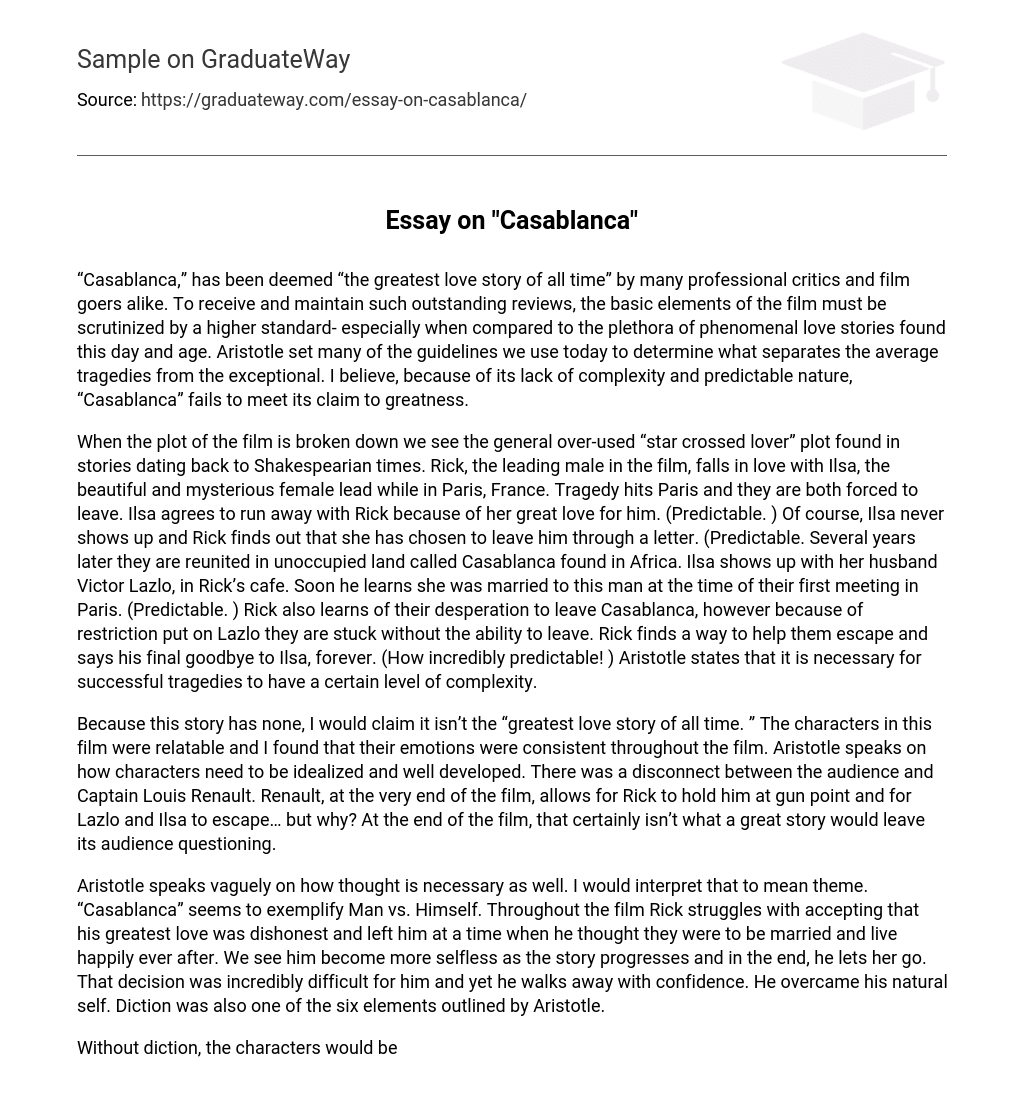The film “Casablanca” is frequently acclaimed as “the greatest love story ever told” by both cinema experts and fans. To consistently receive such high praise, it is necessary to thoroughly analyze the film’s essential components, particularly when comparing it to other remarkable love stories of today. Aristotle established several criteria that we currently employ to differentiate between ordinary tragedies and extraordinary ones. However, because of its straightforwardness and predictable storyline, I believe that “Casablanca” does not fully live up to its proclaimed greatness.
When analyzing the film’s plot, it becomes evident that it follows the clichéd “star crossed lover” storyline seen in earlier works, including those by Shakespeare. Rick, the film’s protagonist, falls deeply in love with Ilsa, the enigmatic female lead, during their time in Paris, France. Unfortunately, tragedy strikes Paris, and they are both forced to leave. Despite this setback, Ilsa agrees to elope with Rick due to her intense love for him (unsurprisingly). However, Ilsa never shows up as planned and instead informs Rick of her decision to leave him through a letter (predictable). Several years later, fate brings them together again in Casablanca, an untouched territory located in Africa. To Rick’s dismay, Ilsa arrives at his cafe accompanied by her husband Victor Lazlo. Here, Rick discovers that Ilsa was actually married to Lazlo when they first met in Paris (predictable). Additionally, Rick learns of their desperate desire to escape Casablanca but are hindered by restrictions on Lazlo. Determined to help them flee, Rick bids his final farewell to Ilsa, knowing it’s a permanent goodbye (how incredibly predictable!). Aristotle posits that successful tragedies require a certain degree of intricacy.
Since this story lacks one, I would argue that it is not the “greatest love story of all time.” The film’s characters were relatable, and I found their emotions to be consistent throughout. According to Aristotle, characters should be idealized and well-developed. However, there was a disconnect between the audience and Captain Louis Renault. In the final moments of the film, Renault allows Rick to hold him at gunpoint and lets Lazlo and Ilsa escape… but for what reason? This certainly leaves the audience questioning, which is not what a great story would do.
Aristotle’s mention of thought being necessary can be interpreted as referring to theme. In “Casablanca,” it represents the conflict of Man vs. Himself, as Rick grapples with his true love deceiving and abandoning him when he believed they were meant to be together forever. Throughout the film, we witness Rick’s transformation into a more selfless person, ultimately choosing to let her go. This decision was immensely challenging for him, yet he departs with conviction. Rick managed to overcome his intrinsic nature. It is worth noting that Aristotle identified diction as one of the six elements in his discourse.
Without proper diction, the characters would lack sincerity. This is why people consider “Casablanca” to be truly great. When Ilsa expressed her love for Rick at the beginning of the movie, it was believable. Rick starts by speaking naively but later becomes wiser as he realizes his own naivety. He learns that love does not always conquer all. Sam, the piano player at Rick’s cafe, sets an atmosphere that matches the time and setting of the film. Aristotle briefly acknowledges its significance, adding to its relevance.
When viewing a 1942 film in 2012, the presence of contemporary music aids in grasping the purity of that era, the characters’ adherence to traditional values, and the overall ambiance of their lifetime. The music selection in “Casablanca” effectively conveys this and vividly depicts the time period. Aristotle identified spectacle as the final and least significant aspect in a successful tragedy. The costumes and set designs in this film were fitting and masterfully executed, contributing to the atmosphere and overall credibility.
The audience easily identified the propriety of each character, enabling a clearer perception of social rank and authority when required. Although only two of the six elements outlined by Aristotle were successfully achieved, I maintain my initial analysis that this is not one of the greatest love stories ever told. The overall lack of complexity and predictability diminished the potential of the film and reduced the quality of its tragic nature. Maybe the American Film Industry should watch “Tangled” and acquire some valuable insights on how to create a remarkable love story!





